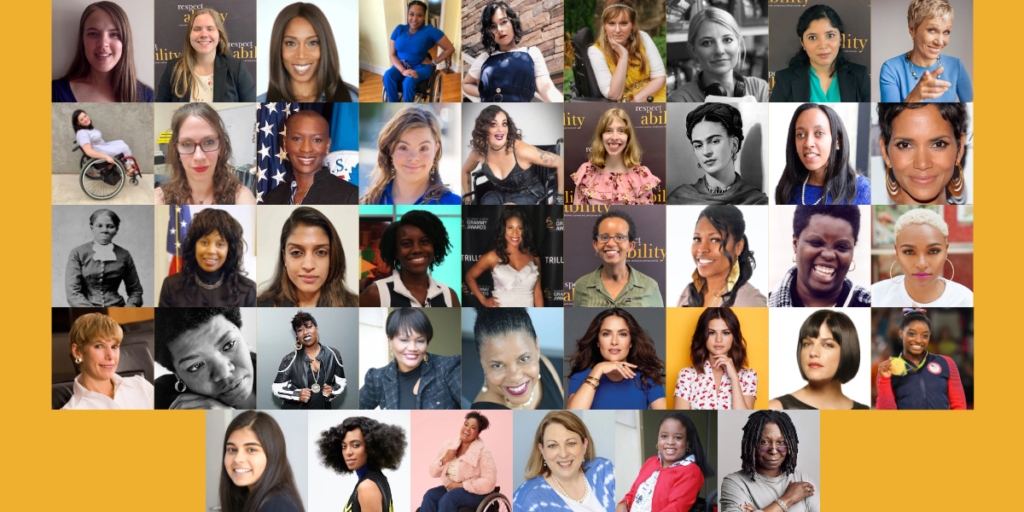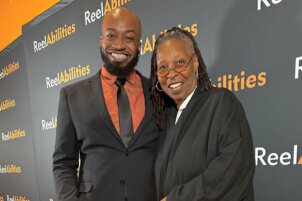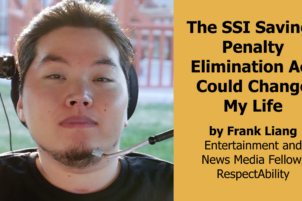 Washington, D.C., March 8 – As we celebrate Women’s History Month and International Women’s Day, it is critical to recognize the unique challenges and critical contributions made by women with disabilities to American society.
Washington, D.C., March 8 – As we celebrate Women’s History Month and International Women’s Day, it is critical to recognize the unique challenges and critical contributions made by women with disabilities to American society.
Data from the Annual Disability Statistics, published by the researchers at the Institute on Disability at the University of New Hampshire, shows that there are 21,201,155 women living with disabilities in America today. This includes 10,174,591 working-age (18-64) women with disabilities, many of whom have been directly impacted by the economic disruptions created by the COVID-19 pandemic.
In 2019, only 3,727,186 working-age women with disabilities had jobs. In the economic expansion prior to the COVID-19 pandemic, only 36.6 percent of working-age women with disabilities were employed in the U.S. compared to 73.8 percent of working-age women without disabilities. This leads to approximately 22.5 percent of women with disabilities living in poverty compared to 13.5 percent of women without disabilities.
“People with disabilities of all backgrounds and genders deserve the opportunity to earn an income and achieve independence, just like anyone else,” said RespectAbility President Jennifer Laszlo Mizrahi, who has dyslexia and knows what it means to parent a child with multiple disabilities.
Some celebrities and business leaders are using their voice to share their stories, educating people about both visible and nonvisible disabilities. These role models make a big difference in setting high expectations for youth with disabilities. People with disabilities of all backgrounds can be amongst the highest achievers on earth. Haben Girma became the first Deafblind woman to graduate from law school when she earned her degree from Harvard Law School in 2013. Harriet Tubman had epilepsy, performer Selena Gomez lives with lupus, business leader and Shark Tank superstar Barbara Corcoran is dyslexic and gymnast Simone Biles has ADHD.
They are perfect candidates for RespectAbility’s #RespectTheAbility campaign, which is shining a light on individuals with disabilities who are succeeding in their chosen careers:
- Maya Angelou: Legendary Poet and Civil Rights Activist Who Had Disability, Inspires Generations
- Khadija Bari: Becoming Her Whole Self
- Halle Berry: Living with Disability While Taking a Stand against Domestic Violence
- Simone Biles: Olympic & Disability Champion Makes History While Mesmerizing Many
- Selma Blair: Positive Role Model for Success for Individuals with Acquired Disabilities
- La’Rina Carolina: Pioneer breaking the inequality lines between deaf and hearing societies
- Barbara Corcoran: Shark Tank Entrepreneur and Business Owner Proves Dyslexics Can Be Successful
- Lois Curtis: Woman with Mental and Intellectual Disabilities Fights for Freedom For All
- Andrea Dalzell: RN Who Uses a Wheelchair Treating COVID-19 Patients in NYC
- Sneha Dave: Super Talent Creates Network for Teens and Young Adults with Chronic Health Conditions
- Ashley Eakin: Changing Media Perceptions of Disability, One Film at a Time
- Missy Elliott: ‘Works it,’ Serves as Role Model for Young Women with Disabilities
- Haben Girma: Deafblind Civil Rights Lawyer Advocates for Disability Rights in Media
- Whoopi Goldberg: Talented Actress, Comedienne and Talk Show Host Lives with Dyslexia
- Lori Golden: Self-Advocate and Trailblazer in Disability Inclusion in the Workplace
- Selena Gomez: Prioritizing Health, Serving as Role Model for Young Women with Disabilities
- Claudia Gordon: First Female Deaf Black Lawyer and Anti-Discrimination Advocate
- Salma Hayek: Sharing Story of Dyslexia, Serving as Role Model for Latina Woman with Disabilities
- Ketrina Hazell: “I am visible. I have worth. I can succeed.”
- Andrea Jennings: Black History Representation Matters in Arts Activism and Civic Leadership
- Frida Kahlo: Through Art, Role Model for Artists, People with Disabilities and Bisexual Women
- Solange Knowles: Role Model for African American Performers with Disabilities
- Janet LaBreck: Successful Pioneer of Change and Role Model for African American Women with Disabilities
- Andrea Lausell: Disability Pride & Hispanic Heritage Pride as One
- Carly Okyle: The Myth of Non-Progression
- Dr. Nelle Richardson: “We are more than enough, and we are standing firmly in our truth!”
- Diana Romero: Award-Winning Producer with Multiple Sclerosis Continues to Find Success in Hollywood
- Cristina Sanz: First Hispanic with a Disability to Win an Emmy Award, Shatters Stigmas
- Abigail Shaw: “You Don’t Look Blind”
- Lauren “Lolo” Spencer: The Importance of Authentic Storytelling
- Harriet Tubman: Legendary Poet and Civil Rights Activist with Epilepsy and TBI, Inspires Generations
- Donna Walton: Creates Nationwide Movement of Representation with Divas With Disabilities
- Lachi: NY Music Sensation & Ardent Disability Champion
RespectAbility has also benefited from the work of our staff and Fellows, a majority of whom are women. Read about their experiences:
- Baksha Ali: She Sees What You Cannot See
- Ariella Barker: This Women’s History Month, I Remember the #MeToo Survivors with Disabilities
- KiAnna Dorsey: Sharing the stories of underrepresented communities
- Cami Howe: Strong Independent Woman Who Doesn’t Need A Knight in Shining Armor
- Ana Kohout: Young Activist Aims to Change Beliefs About People with Disabilities
- Tonya Koslo: Cancer Survivor Who is Helping Others in Need
- Emily Kranking: A Cute But Determined Girl with Cerebral Palsy: Believe It! #DisabledandCute
- Tatiana Lee: Changing Media Perceptions of Disability, one Modeling Job at a Time
- Laka Mitiku Negassa: Brain Injury Survivor Hopes to Support Reform of U.S. Disability Policy
Our nation’s economy is strongest when it is inclusive of the value that diverse talent brings to the workplace. These celebrities are making a difference in how audiences perceive disability. However, brand-name companies such as JP Morgan Chase, Coca-Cola, Pepsi, UPS, Ernst & Young, IBM, Walgreen’s, Starbucks, Walgreens and the software corporation SAP exemplify these values and have specific programs to hire, cultivate and promote people with disabilities. They show that people with disabilities are successful employees and also improve businesses’ bottom lines.
According to Vivian G. Bass, Vice Chair of RespectAbility’s Board of Directors: “People with disabilities bring a unique skill set that it is very valuable for companies. As it relates to employment and competitiveness in the workplace, we have to stop thinking of disability as a weakness and start thinking of it as an asset.”
The Census Bureau estimates that there are, in total, more than 56 million Americans living with some form of disability. This includes physical, cognitive, sensory, mental health and other disabilities such as spinal cord injuries, being deaf and/or blind, having a learning disability or chronic illness.
The celebrities mentioned above are especially important to acknowledge during Women’s History Month. However, their work should be valued and appreciated year-round. RespectAbility will be highlighting additional female celebrities, as well as those who have made important policy advancements, with disabilities throughout the entire month.
Adding to that work, RespectAbility maintains an active and dynamic National Disability Speakers Bureau, which connects a range of fabulous women and nonbinary people to speaking opportunities at conferences, corporations, and organizations. You can learn more about the Women and Nonbinary Persons Division of our disability speakers bureau online here.







